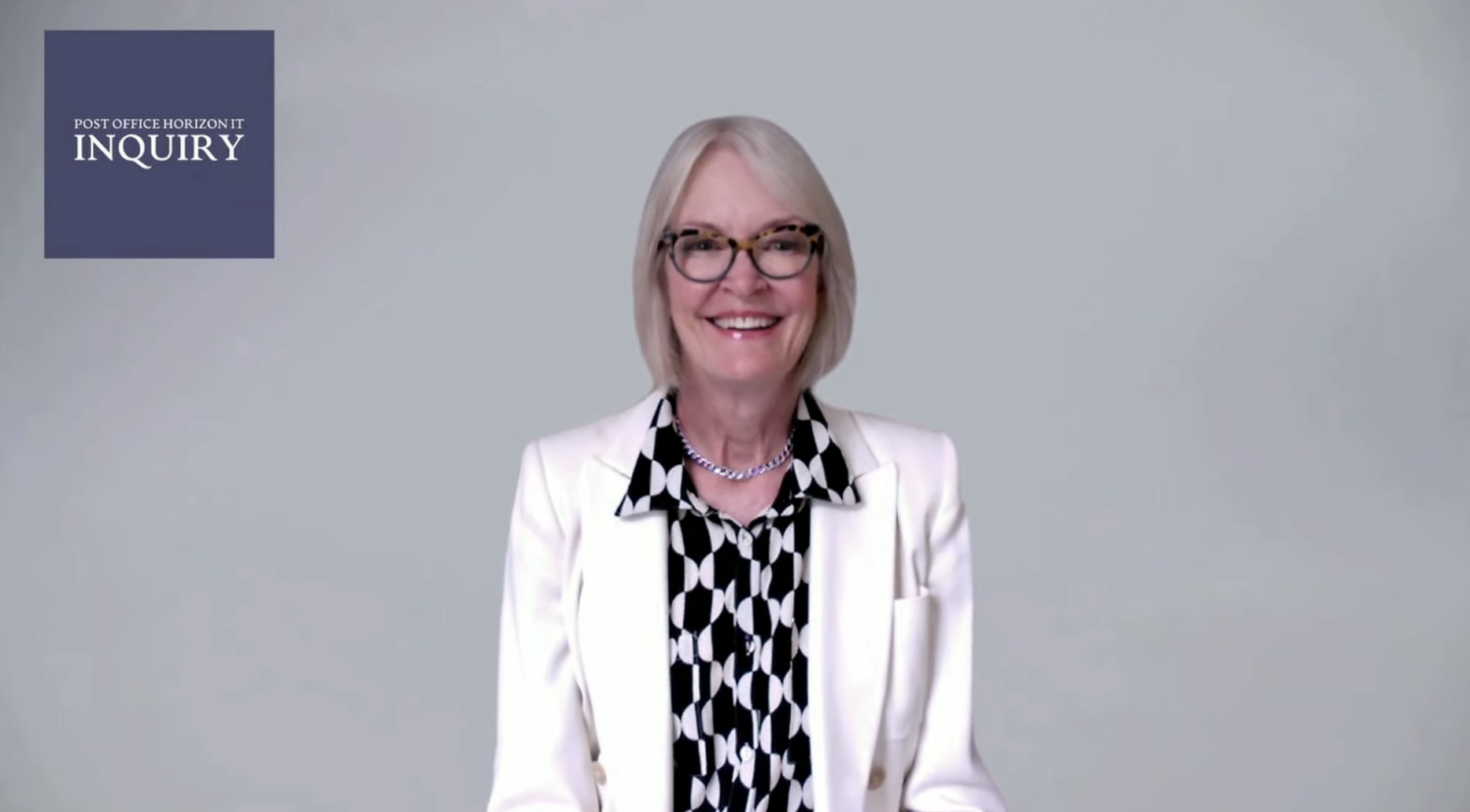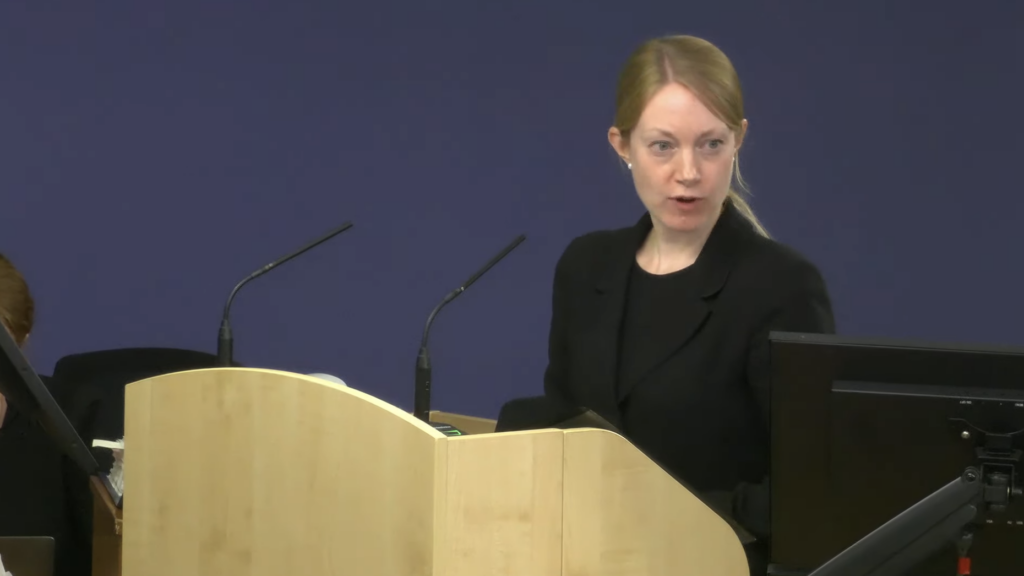
Putting together a list of Postal Affairs ministers a few years back I was reminded of a graffito written shortly after the 33 day papacy of John Paul I, which asked: “What lasts longer, a pope or a wine gum?”
It seemed apt. At a time when ministers should have been getting a solid grip on the Post Office, they were being spun through the Business Department’s revolving doors, reliant on the misleading briefings they were getting from their own civil servants and the Post Office. Throughout this scandal, the tail was wagging the dog.
Today it was the turn of Margot James (Post Office minister from July 2016 – Jan 2018) to give evidence to the Post Office Horizon IT Inquiry. James said she didn’t arrive in post determined to implement fresh ideas – she just had to “inherit” the policies set by her predecessor, telling the inquiry:
“It’s very automatic, the… identity of the minister is completely irrelevant for some of the time, particularly in the early days, then the work just churns through, and instead of your predecessor signing [letters], you’re signing it all…. when circumstances change of course there may well be a change [of policy] and that would then be yours to approve.”
Emma Price, the barrister asking questions on behalf of the inquiry, asked:
“In the absence of a change in circumstances, would you routinely sit down and approve – or consider whether you wanted to approve – standard lines on agreed policy lines when you took the role?”
“Not as a rule, no”, replied James.
James took over from Baroness Neville-Rolfe, whose tenure from May 2015 to July 2016, was even shorter than hers. Neville-Rolfe didn’t give James any handover, formal or informal. Because James took over as part of a new government – even though it was switching from one Conservative administration to another – all the ministerial departmental knowledge was swept away.
James told Price it was “unfortunate” that she was working with “an entirely new ministerial team and private office team.” She added: “I don’t think my private office had experience of handling any aspects of my brief left over from my predecessor.”
For the first six months James continued to churn out the Post Office party line – there was nothing wrong with the Horizon system, and the Subpostmasters’ complaints were baseless.
Biggest regret
In her witness statement to the Inquiry, James writes that at some unspecified point, she became “uncomfortable” with this. James told Price her growing discomfort was due to the letters she was getting from Postmasters “who tended to write to me directly… After I had received a few of those letters, I started to think that the advice I was getting did not reflect what seemed to be happening to the people who were writing to me.”

Price wondered what aspect of the civil servants’ advice made the minister uncomfortable.
James replied: “The thing I started to doubt was the fact that all of the complainants were guilty of some sort of incompetence, or theft, or false accounting, or the things I’d been told were causing the criticism of the Post Office and its computer system.”
James repeated throughout the day that her biggest regret was not asking to see Second Sight’s Interim or final reports, both produced before she took office. She told Price: “I could have asked them – I want a copy of the Second Sight report, both of them – and I didn’t ask that question.”
James told the Inquiry: “that was possibly my biggest mistake. Especially [not asking for] the second one*. If I’d ever been able to get the second one out of them.”
James’ passivity was a problem. She was told twice in her “day one” briefing pack, that she should get a special briefing on the issues being raised by Subpostmasters. She didn’t get it, but she didn’t ask for it, either. Later in her tenure, James received another briefing note before meeting up with representatives from the Post Office. In that briefing note, there was a specific section on problems with Horizon and the campaign by the Subpostmasters. It said: “Suggest we give you a fuller briefing on this as it regularly flares up.”
There is no record of this happening. James accepts she should have asked for the briefing, but didn’t.
Body language
James said that when she did raise Horizon issues with Post Office CEO Paula Vennells and her cronies: “I felt I was fobbed off, because in general they would find different ways of saying the same thing in response to my questions.” Raising Horizon problems seemed to have visible effect on Post Office staff. “On all occasions there was a change in demeanour – a wish to shut the conversation down as soon as could be done so politely.”
James also noted the Post Office was “very good at presenting themselves as the victim in all this. They came across as beleaguered. What more could they have done? They’ve set up this mediation scheme. They’ve improved their training processes. There were occasional faults, as with any computer system, [but] nothing capable of causing the amount of harm alleged.”
James told Price: “I wasn’t wholly satisfied with this, but that was the sort of tenor of the explanation when I probed more.”
Later in her evidence James expanded on Post Office’s victim mentality – noting examples such as the use of the word “orchestrated” when describing the Subpostmasters’ campaign “as if to say there was absolutely no legitimacy to this campaign whatsoever, that sort of thing. The [Post Office’s] language would be based on an assumption that postmasters were in general guilty of something. It might be fraud, it might be theft, it might be joining an illegitimate campaign to undermine something that the Post Office was doing, like putting a mediation scheme in place.”
There are PhD theses to be written about Post Office’s delusions during its peak flat earth phase – how its exec and board cannoned about between bewildered self-pity, corporate righteousness, pitiless cruelty and ruthless abuse of state power – all in denial of a truth it either knew or feared it knew.
Sadly, James, like all her predecessors and successors, were not determined enough nor had the ministerial bandwidth to crack through it. But it should not have been down to the ministers alone – they should have had support from their departmental civil servants, whether at ShEx/UKGI, or from within the Business Department.
During James’ evidence, Price showed her a July 2016 internal UKGI note about the need to “manage interest and wobbles from the Ministers” including “preparing fall-back options if the current arms-length position becomes untenable.” Another sentence in the same document read: “we are managing Ministers’ involvement, with the intention of keeping the issue independent of Government.”
James told Price: “What is written there… about ministerial wobbles and preserving the arm’s length position… That is not really consistent with the civil service values of integrity, honesty impartiality and objectivity, in my opinion. I think it is an example of a team of people who… have gone rogue and abandoned those principles.”
Terry and Cindy Seeney
At the end of James’ evidence, Sam Stein KC asked a couple of questions on behalf of the Subpostmasters he represents. One of them, Terry Seeney, was present in the hearing room with his wife Cindy. Terry and Cindy kindly came along to one of the live events I did in Wimborne earlier this year. They ran a Dorset Post Office between 2002 and 2006. They are a lovely couple.

Stein described to James what the Seeneys went through, noting the stresses Horizon-generated losses put on their relationship to the extent Terry was spending so long away from home working on the branch accounts that Cindy suspected him of having an affair. Terry became ill with stress and suspicious. He started searching the bags of the people that he employed within their branch.
Stein asked if family members and spouses were victims as much as the Subpostmasters themselves. James replied:
“I most certainly agree with you, and I would add… the staff in branches as well as family members. Yes, and a whole network, I would imagine, of family and friends. You… touch[ed] on some of the consequences that are not automatically visible to people from this tragedy. When you mentioned the length of time Mr Seeney was spending in the Post Office led his wife to doubt him… it can have, and I’m sure has had, so many effects on people’s friendship groups and their esteem within their community.”
Stein wondered if, therefore, they were deserving of compensation too. James said: “I do agree that they are deserving, of course. Yes I do, most certainly. I mean, that’s obviously for not for me to judge, but that is my opinion, yes.”
After the hearing I asked the Seeneys what they made of James’ evidence. Terry said “They all believe the lie, you know. [It’s all] ‘Oh I should have done this, I should have done that.’ Well, they’re the minister.”
Terry bemoaned the fact it all seemed to be about “hindsight, always: ‘With hindsight….’ Hindsight’s a wonderful thing. Okay, and… The ministers don’t have enough time in their job. They’re moved from one department to another, and no one tells them what happened before. There’s no liaison. They should be given a job [and told], ‘Right, you’ve got that for four years.’ You know, for the life of the Parliament. Not ‘keep moving!’. They’ve hardly got there before they’re moved to another department, and they’ve got no experience of that.”
Cindy ran the shop attached to the Seeneys’ Post Office and helped out behind the counter, but Terry did all the numbers. He kept the losses to himself. Cindy told me how it changed him.
“He wasn’t opening up about anything, and refused to talk about anything. I was left with that suspicion. It was horrible. It was a nasty stress…. he was a right s***.”
Terry’s moods got so bad, Cindy confided her fears to a friend. The friend said: “Go and have a look at him. Stand in the shop and look at him.” Cindy did so. “He looked like somebody different. He was hollow-eyed, yellow-skinned and I thought ‘he’s got cancer’…. shortly after, he developed psoriasis through stress.”
After putting around £10,000 of retail takings and his own money into the Horizon black hole, Terry had had enough. The couple sold the business at a £50,000 loss and then had to remortgage an extra £30,000 to keep their home. Terry says overall they lost around £100,000, which, if they had kept their assets and been allowed to build on them, would have given them a comfortable retirement. For the last 18 years they’ve been just about scraping by. Terry couldn’t work for several years after giving up the Post Office. He used to love being a football referee, but found he could co longer cope with that either. The Seeneys haven’t yet finished all the assessments and paperwork required to get their compensation claim in. They’re not getting any younger.
“But we survived and we got stronger.” said Terry.
“We did.” agreed Cindy.
“It’s all down to her,” said Terry. “She got me through it.”
* Second Sight actually produced four-ish reports – the Interim Report in 2013, a second report in 2014 (split into two distinct reports) and their final report in 2015. The 2014 report(s) were a foreshadowing of the final report produced on demand for MPs who were getting increasingly agitated about the mediation scheme, its apparent lack of progress and what they were hearing via their constituent applicants about everything going pear-shaped. The second Second Sight 2014 reports, perhaps best thought of as interim interim reports, still attracted a furious rebuttal from the Post Office. The final Second Sight report was a firming up of the 2014 reports and was much stronger. It suggested Second Sight’s work was not finished, but sadly they got sacked shortly after delivering it.
For a blow-by-blow account of James’ evidence with the documents presented to her, click here.
The journalism on this blog is crowdfunded. If you would like to join the “secret email” newsletter, please consider making a one-off donation. The money is used to keep the contents of this website free. You will receive irregular, but informative email updates about the Post Office Horizon IT scandal.

Leave a Reply